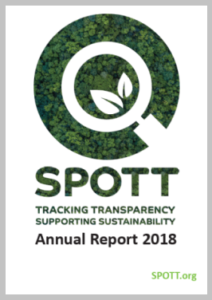2018 has been an eventful and productive year for SPOTT, as we expanded our scope, strengthened our links with the finance sector, and embarked upon a program of work with a geographical focus on the Congo Basin for the timber and pulp assessments.
In January, we launched a joint publication with Aviva Investors addressing the risks, complexities, and key issues relating to responsible investment in the palm oil sector.
March saw the launch of SCRIPT – the Soft Commodity Risk Platform, developed by Global Canopy – which SPOTT is proud to support as a data partner. In April, we published an analysis of the land-use approaches used by palm oil companies assessed on SPOTT.
In July we more than doubled the number of timber and pulp companies assessed on SPOTT, taking the total to 50. Funding awarded by the Department for International Development (DFID) under its Forest Governance, Markets and Climate (FGMC) grant will see this number double again in 2019, with a focus on timber companies in Voluntary Partnership Agreement countries at various stages of forestry sector reform.
As the global demand for palm oil production continues to grow, oil palm plantations are encroaching on new frontiers in Central and South America, and Africa. To address this, we added 20 major companies with operations in all production regions to our assessments in November 2018, bringing the total number of palm oil companies to 70. A further 30 will be added in 2019, and in partnership with French consultancy Transitions these will include assessments of companies at key nodes in the supply chain: crushers and refiners.
2018 assessment results showed that while some companies continue to make significant progress in their environmental, social and governance commitments and disclosure, the majority of those assessed are lagging behind. Average assessment scores declined for both palm oil (from 50.4% in 2017 to 48% in 2018) and timber and pulp (from 37% in 2017 to 31% in 2018). However, this drop partly reflects the increase in SPOTT coverage, as many low-scoring companies were added to the assessment process. Encouragingly, most companies assessed in both 2017 and 2018 saw their scores increase: 34/50 (68%) of palm oil company scores improved, compared with 17/24 (71%) of timber and pulp companies.
In response to an external scoping study commissioned in 2017, in October we announced that we will also expand our sector coverage in the coming year. Natural rubber was identified as the commodity with the greatest opportunity for SPOTT to have an impact, due to the growing sustainability challenges within the sector, and the increasing interest from finance sector and supply chain actors to promote sustainable natural rubber production. Our first assessments of natural rubber producers will be published in autumn 2019.
Momentum is building in both responsible finance and sustainable commodity production. We are going to establish a ‘Supporter Network’ to formalise our engagement with the finance sector, and further raise the profile of SPOTT. We are looking forward to an exciting year ahead as we continue to develop the tools and information needed to engage companies, drive the adoption of best practices, and increase transparency and accountability in forest-risk commodity sectors.

